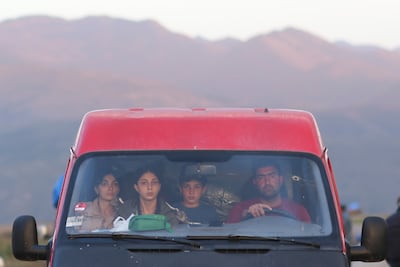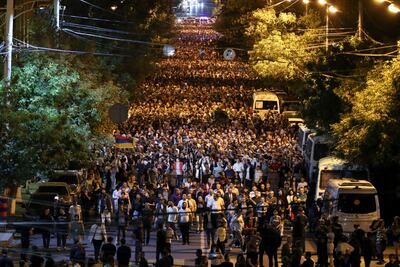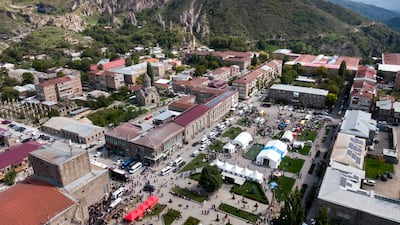A UN mission on Sunday arrived in the conflict-hit region of Nagorno-Karabakh, after more than 100,000 people fled to Armenia in what Azerbaijan denies is a case of ethnic cleansing.
The UN inspectors will assess humanitarian needs in the area after gaining access for the first time in about 30 years.
Azerbaijan agreed to let them in but was criticised by France for only allowing the mission after most ethnic-Armenian residents had already fled.
Pope Francis used his Sunday prayer to urge dialogue in the region, expressing hope for a "lasting agreement that will put an end to the humanitarian crisis".
The region's separatist government surrendered last week after a lightning military offensive by Azerbaijan, agreeing to disarm and disband.
As of Sunday morning a total of 100,483 people had arrived in Armenia after being "forcefully displaced", according to authorities there – most of the population.
About 46,000 refugees are living in temporary accommodation, said Nazeli Baghdasaryan, a spokeswoman for the Armenian Prime Minister's office.
The exodus has rewritten the centuries-old ethnic makeup of the region, which is formally recognised as part of Azerbaijan but has been in dispute since the break-up of the Soviet Union.
Armenian Prime Minister Nikol Pashinyan has several times accused Azerbaijan of ethnic cleansing and "depriving people of their motherland" since the separatists lost control of the region on September 20.
Hikmet Hajiyev, a diplomatic adviser to Azerbaijani President Ilham Aliyev, insisted there was "no single case of violence or atrocity against civilians".
"We cannot accept accusations of ethnic cleansing or genocide," he told AFP. "Ethnic cleansing is a forceful action, when somebody is using force against civilians."

Mr Hajiyev said Azerbaijan had detained "five to six" people whom it accused of war crimes but added people leaving the country were doing so of their own free will.
"They are free. If somebody puts down his gun, they are free and they have decided on their own choice to go to the republic of Armenia," he said.
"If they accept Azerbaijan citizenship, we will protect and ensure their rights and their security, and we will establish a municipality system so that they can govern their affairs at a local level, and religious and cultural rights will be assured."
Day of prayer
Armenia was on Sunday observing a national day of prayer for the region. Hundreds attended a service led by the head of the Armenian Apostolic Church in the country's main cathedral.
The nation of 2.8 million people faces a major challenge housing the sudden influx of refugees. The International Federation of Red Cross and Red Crescent Societies has launched an emergency appeal to raise $22 million to help those fleeing. Armenia has asked the EU for temporary shelters and medical supplies, according to the Italian government.
Protesters have voiced their anger at Mr Pashinyan, who has been blamed by the opposition for failing to defend a region regarded as an ancestral Armenian homeland.
At least 170 people were killed in an explosion at a fuel depot on Monday as refugees scrambled to stock up on petrol, adding to the human toll of the conflict on the mountainous border.
Azerbaijan is holding talks with separatist leaders on the region's "reintegration", while also detaining some senior figures from its former government and military command. Armenia says people are fleeing out of fear of reprisals.

The leaders of the two countries, Mr Aliyev and Mr Pashinyan, are set to meet for western-mediated talks on Thursday after previous EU attempts to broker peace failed to prevent escalation. Previous wars ended in ceasefires in 1994 and 2020.
Thursday's talks will come on the sidelines of a meeting of the European Political Community in Granada, Spain. The EU has urged the two sides to "reiterate publicly their commitment to each other’s territorial integrity and sovereignty".
Armenia, traditionally an ally of Russia, has described its current alliances as inadequate after peacekeepers sent by Moscow failed to enforce a truce.
Mr Pashinyan has urged his country's parliament to make Armenia a member of the International Criminal Court, a step which would aggravate Russia given the court's arrest warrant for President Vladimir Putin.


